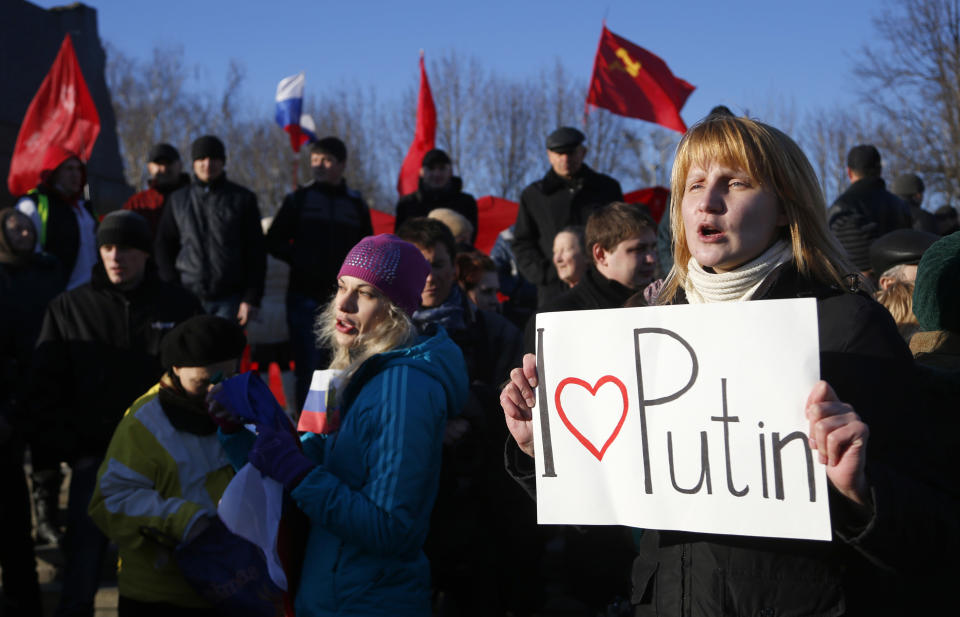Heavier sanctions on Russia could backfire
WASHINGTON (AP) — Underlying the talk about taking harsh punitive measures against Russia for its military incursion into Ukraine are economic complications and worries that sanctions levied against Moscow could, in the words of the Kremlin, "boomerang" back on the U.S. and Europe.
Heavier U.S. and European Union sanctions could sting Russia's already slow-growing economy and hurt its financial sector. But Moscow could retaliate and seize American and other foreign assets or cut exports of natural gas to Europe, which is heavily dependent on Russia for energy.
Russian Foreign Minister Sergey Lavrov on Friday warned Secretary of State John Kerry that U.S. sanctions could "backfire," the Russian foreign ministry said in a statement. During a telephone call, Lavrov urged the U.S. not to take "hasty, poorly thought-out steps that could harm Russian-U.S. relations, especially concerning sanctions, which would unavoidably boomerang on the U.S. itself," the statement said.
In a separate statement on Friday, the Russian Foreign Ministry also warned the European Union that any sanctions it imposed would not go unanswered and would harm "the interests of the EU itself and its member nations."
Declaring his determination not to let the Kremlin carve up Ukraine, President Barack Obama on Thursday slapped new visa restrictions on Russian and other opponents of Ukraine's government in Kiev and authorized wider financial penalties against those involved in the military intervention or in stealing state assets. Obama emphasized his resolve in an hourlong telephone call with Russian President Vladimir Putin, affirming his contention that Russia's actions violate Ukraine's sovereignty.
On Capitol Hill, both chambers of Congress looked to advance legislation imposing hard-hitting sanctions on Russia.
Obama hailed U.S. cooperation with the European Union, which on Thursday suspended talks with Putin's government on a wide-ranging economic agreement and on granting Russian citizens visa-free travel within the 28-nation bloc. But Europe's presidents and prime ministers remain divided on taking more drastic steps such as freezing assets and issuing travel bans on Russian officials.
European hesitancy reflected the reality that targeting influential Russian businessmen or major Russian companies would also harm Europe's economic interests. U.S. trade with Russia is less than one-tenth of Europe's.
Russian investors hold assets worth billions in European banks, particularly in Britain, which is highly protective of its financial sector, and major exporters such as Germany and the Netherlands have far more at stake than the United States in Russia's consumer economy.
Showing greater caution than Obama on sanctions, German Chancellor Angela Merkel said European penalties against Russia depend "on how the diplomatic process progresses." EU President Herman Van Rompuy said travel bans, asset freezes and the cancellation of an EU-Russia summit could still come. Polish Prime Minister Donald Tusk acknowledged "no enthusiasm" in Europe for economic sanctions.
In some ways, the debate over sanctions echoes the Cold War doctrine of military strategy in which if two opponents fired off nuclear weapons, both sides would be annihilated.
"There is a kind of mutually assured destruction relationship here," said Steven Pifer, a former U.S. ambassador to Ukraine and analyst at the Brookings Institution think tank in Washington. "Russia could say, 'Well, we're going to cut off your gas, and you guys can now scramble and buy extra gas and pay big prices.'
"It would hurt the Europeans, but it also would cut off the biggest source of cash that flows into Russia today," he said referring to oil and gas sales that account for about 60 percent of Russia's exports and half of its government revenue. "So the Russians may threaten some things, but they also have to consider that if they do that what it would do to the Russian economy."
___
Associated Press writers Julie Pace and Matthew Lee in Washington, Juergen Baetz and Mike Corder in Brussels, Lynn Berry in Moscow and Yuras Karmanau in Simferopol, Ukraine, contributed to this report.




